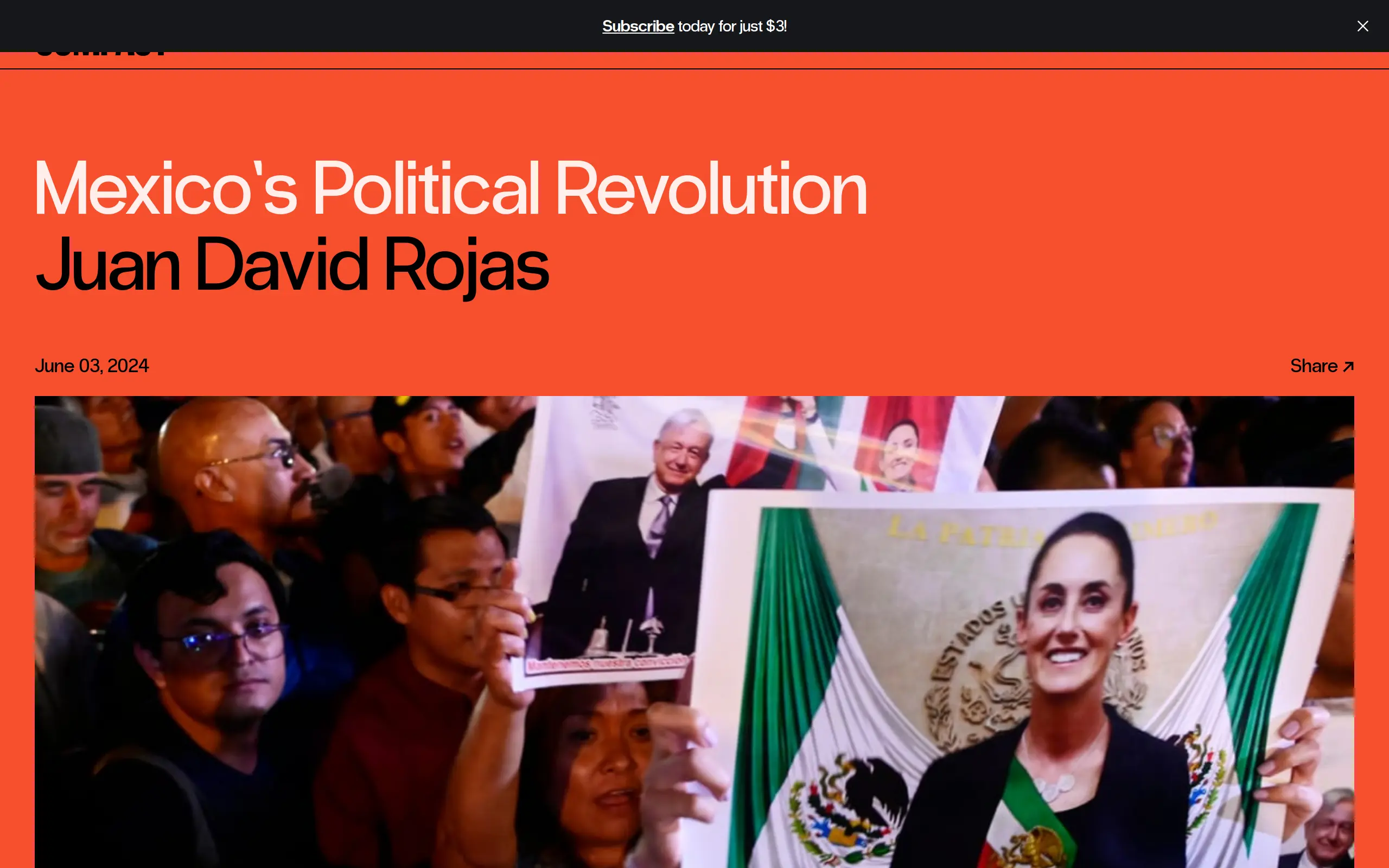- cross-posted to:
- [email protected]
- [email protected]
- cross-posted to:
- [email protected]
- [email protected]
Sheinbaum’s victory, like AMLO’s popularity, is readily explicable. By virtually every metric, ordinary Mexicans are better off than when López Obrador assumed office in 2018. Unemployment hit a record low of 2.5 percent in 2024, while energy prices rose just 0.1 percent in 2023, despite a global energy crisis. Between 2018 and 2022, the share of Mexicans living below the poverty line fell to 36 percent, down from 42 percent, and has almost certainly declined further since then.
Morena’s crowning achievement is the empowerment of the Mexican working class. The monthly minimum wage rose to 7,468 pesos ($440), from 2,650 pesos in December 2018. The governing coalition has also bolstered the ability of workers to form independent unions and outlawed labor outsourcing. As a result, real wages rose by around 35 percent across all labor categories between 2019 and 2023. As one voter who traveled all the way from the border state of Tamaulipas to see Sheinbaum’s campaign close in Mexico City told me, AMLO “was the first president in my lifetime who ever gave a damn about the people.”
What makes these gains all the more remarkable is that economic growth remained tepid at around 2 percent through much of AMLO’s term, although a post-pandemic nearshoring boom pushed up GDP by 3.4 percent in 2023. Put simply, AMLO and his party have redirected gains from limited growth to the benefit of the majority of Mexicans, as opposed to crony capitalists and state bureaucrats. For perspective, real wages in Mexico have grown as much as in the Dominican Republic, another epicenter of recent nearshoring, where the growth rate has exceeded 5 percent during the same period.
Defying the stereotype of left-populist leaders as irresponsible big spenders, AMLO has also shown considerable fiscal responsibility. Since 2018, Mexico’s cumulative budget deficit has averaged around 3 percent, far lower than both Latin-American and developed peers. Consequently, debt-to-GDP ratio has remained stable around 55 percent, with the central bank amassing significant dollar reserves. Meanwhile, the administration has tightened the screws on tax evasion, increasing collection from the country’s highest earners by 60 percent.
All this is mostly ignored by progressive media outlets one might assume would be sympathetic to a popular left-wing leader. International coverage, like the largely opposition-controlled Mexican media, has preferred instead to focus on both the real and imagined flaws of Morena’s rule. In the first category, crime and insecurity remain a serious problem. The question now is whether Sheinbaum can not only preserve, but build on AMLO’s achievements.
“AMLO has laid the groundwork for a workers’ republic in Mexico.” Claudia Sheinbaum differs from her predecessor in background and temperament. AMLO is a rabble-rousing machine politician from a modest background in the country’s rural south. Sheinbaum grew up in Mexico City in a family of scientists immersed in radical politics. She followed her parents’ example by joining left-wing student movements and obtaining degrees in physics and energy engineering. By 2000, she served as AMLO’s environment secretary during his term as mayor of Mexico City while both were members of the Democratic Revolutionary Party or PRD, the largest left-wing opposition party. During AMLO’s presidential bids in 2006 and 2012, she became one of his closest confidants and a founding member of Morena after he split from the PRD in 2014. In 2018, Sheinbaum followed in her mentor’s footsteps, becoming mayor of Mexico City, serving until she stepped down to campaign for president last year.
AMLO is beloved by many for his fiery oratory, which gets him accused of demagoguery by his enemies. In contrast, Sheinbaum is seen as perhaps overly technocratic, if also an effective administrator. During her tenure as mayor, she oversaw an even more effective expansion of social programs than Morena achieved at the national level, and presided over a noticeable improvement in security. Many voters told me they were struck by her skill at giving detailed answers to interview questions, but also felt that she often appeared overly rigid and uncharismatic. Sheinbaum has hewed so close to AMLO during the campaign that at times one gets the sense that she is telling morenistas—and the president—what they want to hear.
Those familiar with Latin-American politics will recognize a pattern that could be dubbed the “successor curse.” From Juan Manuel Santos in Colombia to Lenin Moreno in Ecuador, various presidential successors ended up betraying their popular predecessors and in some cases, presided over stunning political downfalls. Sheinbaum has shown an enduring loyalty to AMLO, and thus seems unlikely to turn her back on his legacy. Instead, the precedent that troubles observers sympathetic to Morena is that of Brazil’s impeached former left-wing president, Dilma Rousseff, who succeeded Luiz Inácio Lula da Silva after his second term ended in 2010. Rousseff’s lack of charisma and reluctance to engage in the sort of pork-barrel politics that had sustained Lula’s popularity helped bring about her ouster and a social unraveling from which Brazil has yet to fully recover.


